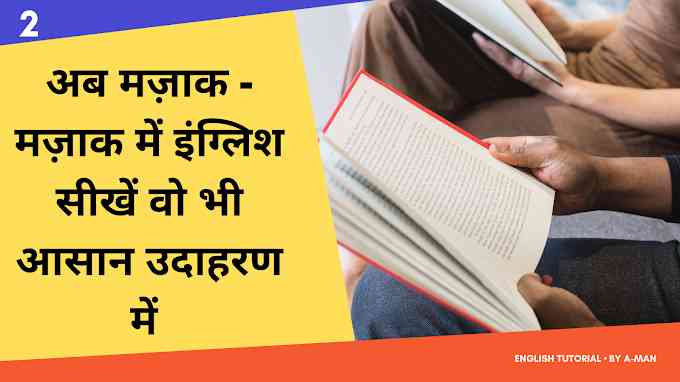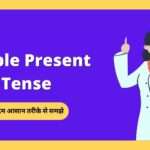Daily Use English sentence in Hindi
यह Article इस आधार पर लिखा गया है जिन्होंने tense और grammar पढ़ी है यहाँ पर ऐसे words का use बताया गया है जिन्हे आप रोजमर्रा कि बोलचाल मे उपयोग करते हैं।
 |
Simple sentences – Should (should ka prayog) |
Id – चाहिए ,करूँ, ऊँ
Uses – advise take & give
Rule – sub+should+m.v.1st+obj.+o.w.
Ex. मुझे अंग्रेजी बोलनी चाहिए we should speak English.
आपको प्रैक्टिस करनी चाहिए you should practice.
Negative sentences
Rule – sub+should+not(shouldn’t )+m.v.1st +obj+o.w.
Ex. हमे समय बर्बाद नहीं करना चाहिए we shouldn’t waste time.
हमे बच्चों को नहीं डाटना चाहिए we shouldn’t scald children.
Interrogative sentences
Rule- should +sub+ m.v.1st +obj+o.w.
Ex. क्या मुझे अंग्रेजी बोलना चाहिए should I speak English.
क्या तुम्हें पढ़ना चाहिए should you read.
Interrogative negative sentences
Rule – shouldn’t +sub.+m.v.1st +obj+o.w.
Ex. क्या मुझे रमेश को नहीं पीटना चाहिए shouldn’t I beat ramesh.
क्या हमे संघर्ष नहीं करना चाहिए shouldn’t we struggle.
Should have (चाहिये था)
Rule- sub+should have +m.v.3rd +obj.
Ex. मुझे घड़ी बनवानी चाहिए थी
I should have got watch repaired.
मझे समय बर्बाद नहीं करना चाहिए था
I shouldn’t have waste time.
क्या मुझे घड़ी बनवानी चाहिए थी
Should I have got repair the watch.
Questions words
- When -कब ,जब
- What-क्या
- How-कैसे
- Why-क्यों
- Where-कहाँ
- Who-कौन
- From where-कहाँ से
- From when –कब से
- For what- किसलिए
- On which date-किस तारीक
- On which day-किस दिन
- At what time-कितने बजे
- What kind of /which kind of-किस तरह
- Whose –किसका ,किसकी
- For whom – किसके लिए
- Whom-किसके ,किसको ,किसे
- How long- कब से
- For how long-कब तक
- How aften –कितनी बार
- How late – कितनी देर
- How many- कितने (countable noun)
- How much –कितना (uncountable noun)
- Which – कौन सी ,कौन सा
- In which – किसमे
- By which – किससे
Double interrogative sentences
Rule – Q.w.+ should +sub +M.v. 1st +obj.
Ex. हमे कब उठना चाहिए ? when should we arise?
मैं अंग्रेजी सीखने के लिए कहाँ जाऊँ where should I go to learn English?
आपको क्लास रूम मे कैसे बैठना चाहिए how should you sit in the class room?
Also – भी, always – हमेशा, never- कभी भी नहीं, aften – अक्सर
इन words का use helping verb के बाद किया जाता है।
Ex. हमे भी पूजा करनी चाहिए
we should also worship.
आपको हमेशा मम्मी पापा कि सेवा करनी चाहिए
we should always serves parents.
हमे कभी किसी का दिल नहीं दुखाना चाहिए
We should never hurt anyone.
आपको प्रायः मंदिर जाना चाहिए
you should aften go to temple.
Alone – अकेले , sometimes – कभी –कभी, together – साथ-साथ /मिलजुल कर इन words का use sentences के last मे होता है।
Ex. हमे आधी रात को अकेले नहीं घूमना चाहिए
We shouldn’t roam midnight alone.
आपको कभी कभी जरूरत मंदों कि मदद करनी चाहिए
You should help needy sometimes.
हमे साथ साथ पढ़ना चाहिए
we should study together.
In order to- के सिलसिले मे , at the instance of – के कहने पर
In brought day light – दिन दहाड़े
Ex. तुम्हें मेरे काम के सिलसिले मे भोपाल जाना चाहिए
You should go to Bhopal in order to my works.
मुझे गोलू के कहने पर किशन कि बेज़्जति नहीं करनी चाहिए
I shouldn’t insult kishan at instance of golu.
आपको दिन दहाड़े सफेद झूठ नहीं बोलना चाहिए
You shouldn’t speak white lie in brought day light.
हमे कभी भी दतनिपोरी नहीं करनी चाहिए
we should never grin.
Can Simple sentences (can ka prayog)
Uses – ability ,possibility of use
Id – सकता हूँ , सकता है , सकते है
Rule – sub+ can+m.v. 1st +obj+o.w.
Ex. मैं सभी भाषाएं बोल सकता हूँ
I can speak all languages.
मैं नाच सकता हूँ
I can dance.
Negative sentences
Rule – sub+ can+not(can’t)+m.v. 1st +obj+o.w.
Ex. मैं झूठ नहीं बोल सकता हूँ।
I can’t lie.
मैं पढ़ नहीं सकता हूँ।
I can’t read .
Interrogative sentences
Rule – can +sub + m.v. 1st + obj+o.w.
Ex. क्या आप मेरे लिए एक ग्लास पानी ला सकते हैं ?
Can you fetch a glass of water for me ?
क्या तुम मुझे 150 रुपया दे सकते हो ?
Can you give me 150 Rs ?
Interrogative negative sentences
Rule – can+not (can’t) +sub + m.v. 1st + obj+o.w.
Ex. क्या आप रोड पर अकेले नहीं चल सकते है ?
Can’t you walk on road alone. ?
Double interrogative sentences
Rule – Q.w.+ can +sub + m.v. 1st + obj+o.w.
Ex. आप उसे कैसे पीट सकते है।
how can you beat him.
Double interrogative negative sentences
Rule- Q.w.+ can+not (can’t) +sub + m.v. 1st + obj+o.w.
Ex. आप आज से अंग्रेजी क्यों नहीं बोल सकते है ?
Why can’t you speak English from today?
Not only but also sentences न केवल बल्कि भी
(जब sentence मे दो subject हो)
Rule – not only +sub1 +but +sub2 +also +H.V.+m.v. +o.w.
Ex. न केवल आप बल्कि मैं भी अंग्रेजी बोल सकता हूँ।
Not only you but I also can speak English.
न केवल वे बल्कि तुम भी पढ़ा सकते हो
Not only they but you also can teach.
(जब sentence मे दो verb हों )
Rule –sub +h.v.+not only +m.v.1+but +also +m.v.2+obj.
Ex. मैं न केवल गाना गा सकता हूँ बल्कि नाच भी सकता हूँ।
I can not only sing a song but also dance.
मै न केवल English लिख सकता हु बल्कि बोल भी सकता हू।
I can not only write but also speak English.
(जब sentence मे दो obj. हों )
Rule – h.v. +m.v. +not only +obj.1 +but also +obj.2
Ex. मैं न केवल अंग्रेजी बल्कि तमिल भी बोल सकता हूँ।
I can speak not only English but also tamil.
Either or sentences / या तो या
(जब sentence मे दो subject हो)
Rule – Either +sub1 +or +sub2+h.v. +m.v. +obj.
Ex. या तो तुम्हें या उसे बाहर जाना चाहिए ।
Either you or he should go outside.
या तो मैं या तुम पूजा कर सकते हो।
Either I or you can worship.
(जब sentence मे दो verb हो)
Rule-sub +h.v. +either +m.v.1st +or+m.v.2nd +obj.
Ex. अमन या तो कक्षा मे शांत बैठे या बाहर जा सकते है।
Aman can either sit silent in class or go outside.
इस प्रकार हम rules को should मे भी use कर सकते है।
आपको या तो हसना चाहिए या बोलना चाहिए ।
You should either lough or speak.
Neither Nor Sentences / न तो न
(जब sentence मे दो subject हो )
Rule – Neither +sub1 +nor sub2+h.v.+m.v.+obj.
Ex. न तो मैं न वह उसे सबक सिखा सकता है ।
Neither I nor he can teach him a lesson.
न तो तुम न श्याम गाना गा सकता है ।
Neither I nor shyam can sing a song.
(जब sentence मे दो verb हो)
Rule – sub +h.v.+neither+m.v.1st +nor +m.v.2nd +obj.
Ex. राधा न तो बोल सकती है न हॅस सकती है ।
Radha can neither speak nor lough.
आप न तो पीट सकते है न समझा सकते है ।
You can neither beat nor make understand.
Could ka use / यह can का past participle है
Id – पाया ,पायी,पाए ,सका ,सकी ,सके
Rule – sub +could +m.v.1st +obj.
Ex. मैं पढ़ पाया ।
I could read.
अगर वह थोड़ी और कोशिश करता तो वह सबसे अच्छा कर पाता
He could do the best if he tried little more.
जब मैं जवान था तब मैं तेजी से दौड़ सकता था
I could run fast when I was young.
Negative sentences
Rule – sub +could+not (couldn’t ) +m.v.1st +obj.
Ex. मैं कोचिंग नहीं आ पाया
I couldn’t come to coaching.
मैं बैंक नहीं जा सका
I couldn’t go to bank.
Interrogative sentences
Rule – Couldn’t +sub +m.v.1st +obj.
Ex. क्या आप अच्छी जॉब नहीं पा सके ?
Couldn’t you get a good job ?
क्या मैं उसकी मदद नहीं कर पाया ?
couldn’t I help him ?
Double interrogative sentences
Rule – Q.w. +couldn’t +sub+m.v.1st +obj.
Ex. आप कल कोचिंग क्यों नही आ सके ?
Why couldn’t you come to coaching yesterday ?
आप अपनी गलती क्यों नहीं सुधार सके ?
Why couldn’t you rectify your mistake ?
To / For
Id – ने , के लिए ,
Rule – To +m.v.1st +obj.
For +m.v.1st +obj.
- Ex. अच्छी जॉब पाने के लिए – To get a good job.
- कड़ी मेहनत करने के लिए – To work hard.
- आपको फोन करने के लिए – To call you.
- किस लिए what for
- मैं इसके लिए हूँ I’m for it.
- मेरे लिए पकाओ cook for me.
- मेरे लिए प्रार्थना करो pray for me.s
- यह हमारे लिए है it’s for us.
Before ka use (पहले )
Id – ने , के लिए
Rule – before+m.v.4 (m.v.+ing) +obj.
- Ex.इंग्लिश सीखने के पहले Before learning English.
- नाचने के पहले Before dancing.
- आने के पहले Before coming .
- Before dancing I should stretching.
After ka prayog ( बाद मे )
Id – ने , के बाद
Rule – after+m.v.4+obj.
- Ex. खाना खाने के बाद after having food.
- नाचने के बाद मुझे आराम करना चाहिए – After dancing I should rest.
Without ka use ( के बिना )
- आप बिना कड़ी मेहनत के अंग्रेजी नहीं बोल सकते – You can’t speak English without hard work.
- मैं तुम्हारे बिना नहीं रह सकता – I can’t live without you
Would like to / would love to sentences
Id – चाहूँगा , चाहूँगी , चाहेंगे ,पसंद करूंगा ,करूंगी,
Rule – sub +would like to /love to+m.v.1st+obj.+o.w.
- Ex. मैं आपसे बात करना पसंद करूंगा – I would like to talk to you.
- मैं आपको बताना चाहूँगा – I would like to tell.
Negative sentences
Rule – sub +wouldn’t like to /love to +m.v.+obj.+o.w.
- Ex. आप मेरे साथ रहना पसंद नहीं करोगे – You wouldn’t like to live with me
Interrogative sentences
Rule – would +sub +like to /love to +m.v. +obj.+o.w.
- Ex. क्या आप पार्टी देना चाहोगे – Would you like to throw the party.
Interrogative negative sentences
Rule – wouldn’t +sub +like to /love to +m.v.+ obj.+o.w.
- Ex. क्या आप मुझे पैसा नहीं देना चाहोगे – Wouldn’t you like to give money to me?
Used to sentences examples
Uses– past कि आदतों को बताने के लिए
Id – या करता था , ये करती थी , करते थे
Rule – sub + used to +m.v.1st +obj.+o.w.
Ex. मैं लुका छिपी का खेल खेला करता था
I used to play game of hide and seek.
मैं उसे चिढ़ाया करता था और वो रोया करती थी
I used to irritate her and she used to cry.
आप बहाने बनाया करते थे
You used to make excuses.
जब कभी भी आप हँसा करते थे फूल बरसा करते थे
Whenever you used to laugh used to shower flowers.
Also Read : English kaise sikhe Secret Tips


